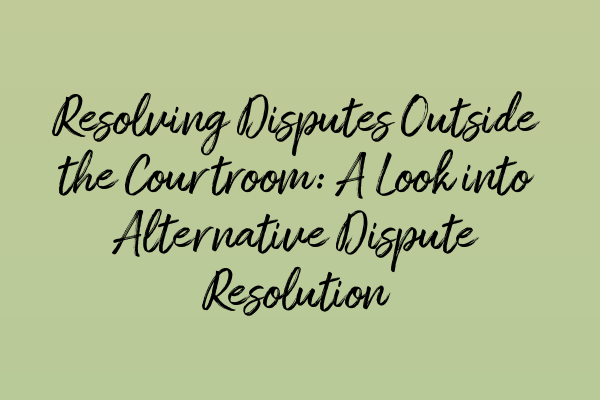Resolving Disputes Outside the Courtroom: A Look into Alternative Dispute Resolution
When it comes to legal disputes, the image that often comes to mind is a courtroom drama with two parties arguing their cases in front of a judge and jury. While this may be a familiar scene from movies and television, it is not the only way to resolve conflicts. In fact, there is a whole realm of alternative dispute resolution (ADR) methods that can effectively and efficiently resolve disputes without the need for a courtroom battle. In this article, we will explore the concept of Alternative Dispute Resolution and how it can be a viable option for resolving various legal disputes.
Alternative Dispute Resolution (ADR) refers to a collection of methods that offer parties involved in a dispute an alternative to conventional litigation. These methods are voluntary, flexible, and provide parties with more control over the outcome of their dispute. ADR can be used to resolve a wide range of conflicts, including but not limited to family disputes, commercial disputes, employment disputes, and even criminal cases.
One of the most popular forms of ADR is mediation. Mediation involves a neutral third party, known as the mediator, who helps the parties in dispute reach a mutually acceptable resolution. The mediator facilitates communication between the parties and assists them in identifying their interests and exploring possible solutions. Unlike litigation, mediation allows the parties to maintain control over the outcome and promotes a cooperative environment where both sides work together to find a resolution.
Another common form of ADR is arbitration. In arbitration, the parties present their cases to a neutral third party known as the arbitrator. The arbitrator then reviews the evidence, listens to the arguments, and makes a binding decision that both parties agree to abide by. Arbitration can be quicker and less formal than traditional litigation, which makes it an attractive option for resolving disputes efficiently.
In addition to mediation and arbitration, there are other ADR methods such as negotiation, conciliation, and collaborative law. These methods offer parties the opportunity to resolve their disputes through open communication, compromise, and creative problem-solving. They provide a more efficient and cost-effective alternative to going to court, which can be time-consuming and expensive.
Now, you might be wondering why ADR is gaining popularity and why parties are opting for these methods instead of going to court. Well, there are several reasons:
- Cost-effectiveness: ADR methods are generally less expensive than going to court. Parties can save on legal fees, court costs, and the associated expenses of a full-blown litigation process.
- Time-saving: ADR processes can often be completed faster than traditional litigation. The parties have more control over the timeline and can schedule sessions at their convenience.
- Privacy and Confidentiality: ADR methods offer greater privacy and confidentiality compared to court proceedings. Parties can avoid public scrutiny and keep sensitive information out of the public domain.
- Maintaining relationships: In some cases, the parties involved in a dispute may have an ongoing relationship, such as business partners, neighbors, or family members. ADR provides a platform to address the issues and restore the relationship in a more amicable way.
It is important to note that while ADR can be an effective method of resolving disputes, it may not be suitable for all situations. Certain disputes, such as those involving serious criminal offenses or matters requiring legal precedent, may need to be resolved through the court system. However, for many civil disputes, ADR can offer a timely and cost-effective solution.
In conclusion, Alternative Dispute Resolution provides parties with an effective and efficient way to resolve legal disputes outside of the courtroom. Methods such as mediation, arbitration, negotiation, and conciliation offer parties more control over the outcome, save time and money, and promote a cooperative environment. While not appropriate for every situation, ADR can be a valuable tool in providing justice and resolving disputes in a more harmonious manner.
Related Articles:
- Private Prosecutions: Exploring Non-Governmental Prosecutions in Criminal Cases
- Ethical Challenges in Criminal Defence: Navigating Dilemmas
- Understanding Drug-related Offences: Laws and Penalties in the UK
- Magistrates’ Court vs Crown Court: Different Paths in Criminal Proceedings
- Criminal Defence Strategies: Expert Approaches to Protecting Clients’ Interests


Leave a Reply